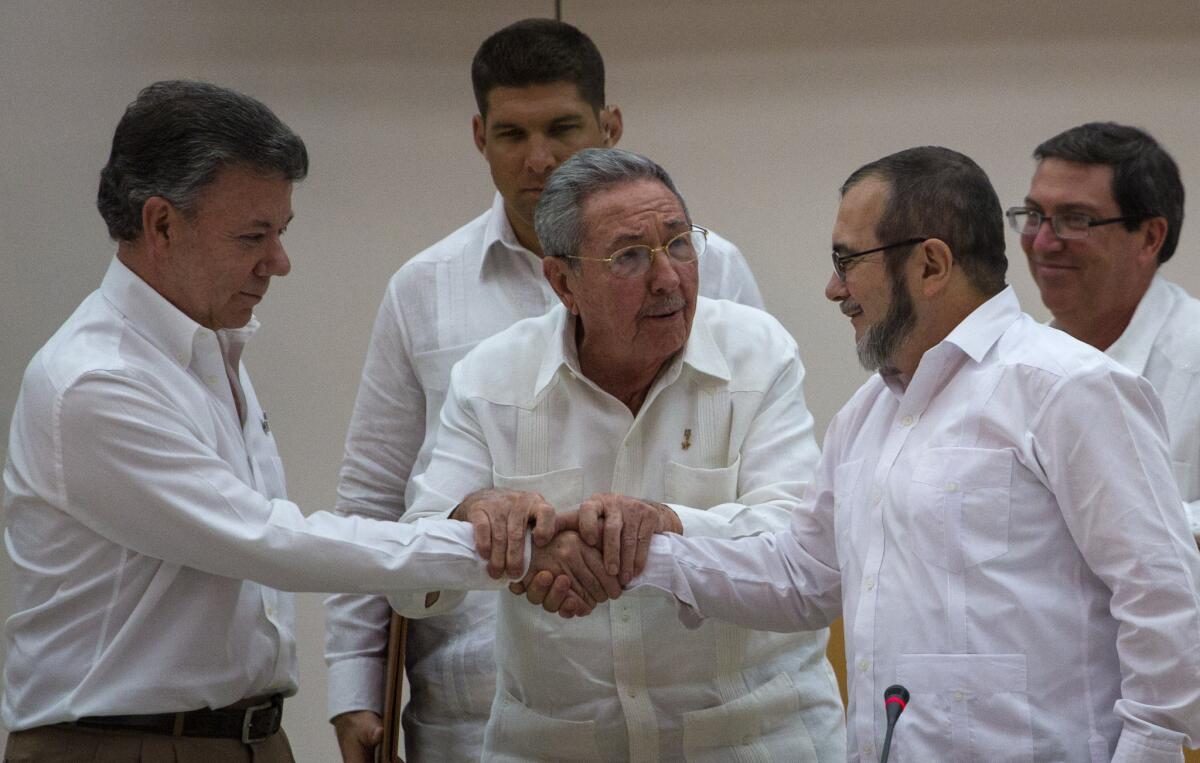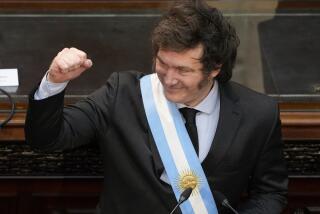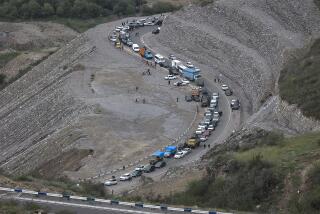‘Major agreement’ moves Colombia and FARC rebels closer to peace

Cuban President Raul Castro, center, encourages Colombian President Juan Manuel Santos, left, and Timoleon Jimenez, commander of the Revolutionary Armed Forces of Colombia, to shake hands in Havana.
- Share via
Reporting from Bogota, Colombia — Colombian government and rebel negotiators meeting in Havana to hammer out an end to 50 years of armed conflict said Wednesday that they had agreed on crucial truth, justice and reparation provisions that have held up progress on a peace accord for more than a year.
In remarks after a joint statement was read at a convention center in the Cuban capital where talks have been held since November 2012, Colombian President Juan Manuel Santos said that overcoming the hurdle opens the way to a comprehensive peace agreement. He set a March 23 deadline for reaching an accord.
Rebels have agreed to lay down their arms within 60 days after such an agreement is signed, Santos said.
“We have achieved an agreement that will achieve the maximum justice for victims and their rights … with guarantees that grave crimes will not remain in impunity,” Santos said. “This is a major agreement.”
Timoleon Jimenez, leader of the Revolutionary Armed Forces of Colombia, which is known by its Spanish initials FARC, did not give a target date for a final accord, saying “enormous difficulties” remain before a peace deal can be signed. But he indicated that an agreement is closer than ever.
“Peace is not only possible, it is indispensable,” said Jimenez, who afterward shook hands with Santos and posed for a photo with him and their host, Cuban President Raul Castro.
Any final peace agreement will be subject to a vote by the Colombian public. It is not clear, however, whether there will be a nationwide plebiscite or a vote by a special congress.
The announcement is an encouraging turn in negotiations that have lasted three years and survived several crises, including a series of bomb attacks in June that almost prompted the government negotiators to abandon the talks.
Progress had been largely stalled since May 2014, when the two sides agreed to drug trafficking provisions calling for the FARC to end all illicit dealings.
“I want to thank the FARC,” Santos said. “We are adversaries on different sides but we are advancing in the same direction, which is toward peace…. We are making an agreement so that [conflict] is never repeated.”
In the joint statement, the two sides agreed to set up two special post-conflict peace tribunals, one for accused offenders who accept responsibility for war crimes and one for those who do not. The agreement also laid down maximum terms of eight years to 20 years.
Rebels won’t be alone in facing the transitional justice system; government armed forces and right wing paramilitaries accused of committing war crimes also will be subject to prosecution.
The agreements also guarantee former rebels the freedom to join the nation’s political process and stand for local and national elections.
Kraul is a special correspondent.
More to Read
Sign up for Essential California
The most important California stories and recommendations in your inbox every morning.
You may occasionally receive promotional content from the Los Angeles Times.










